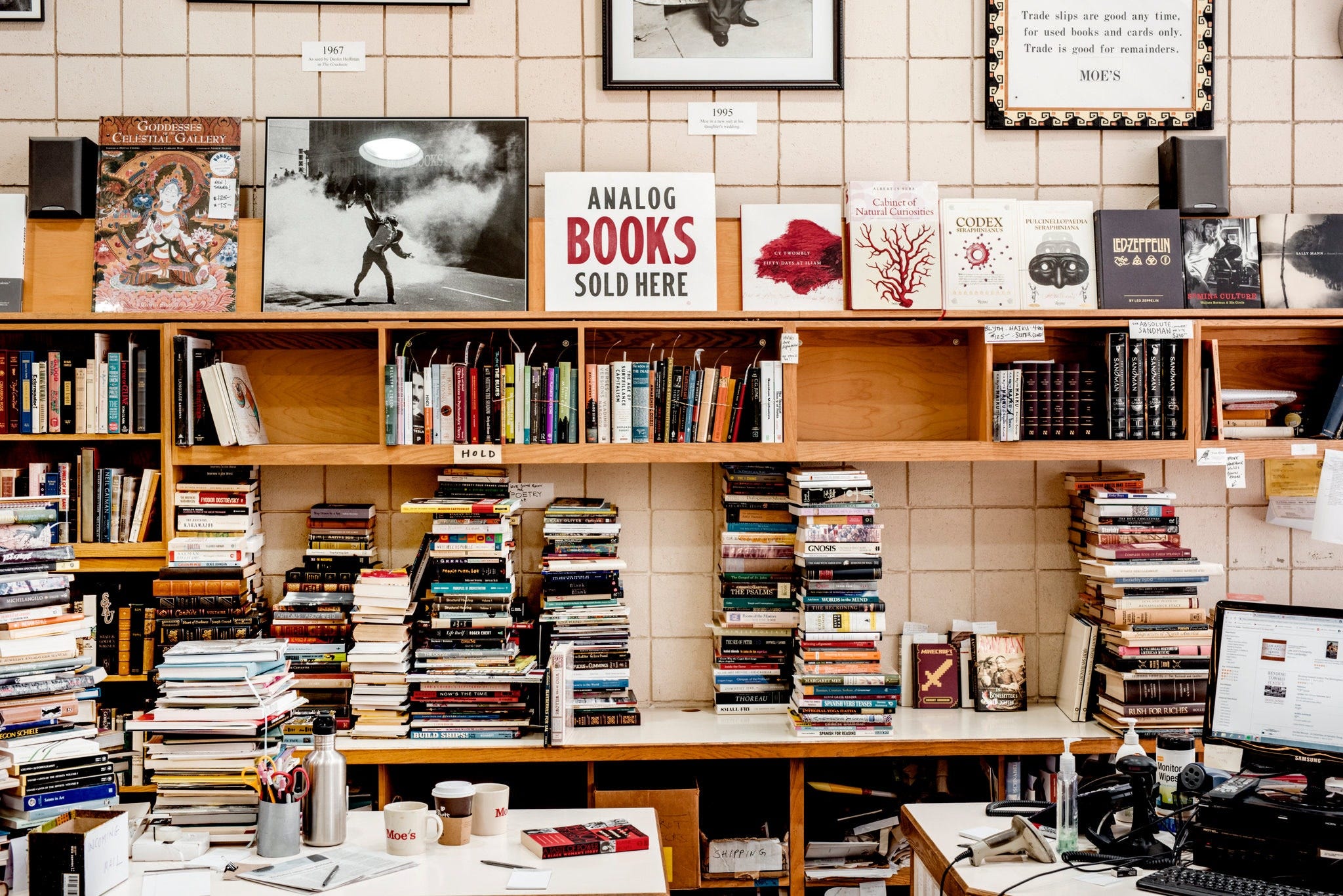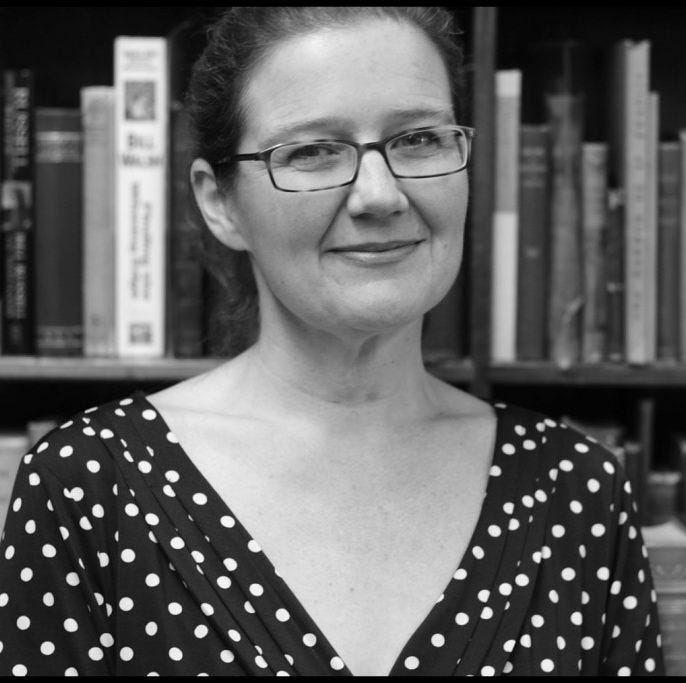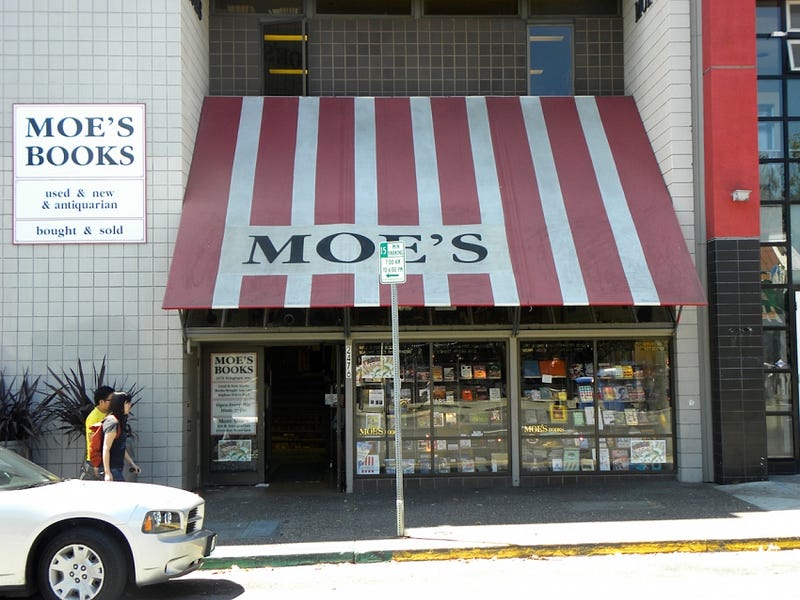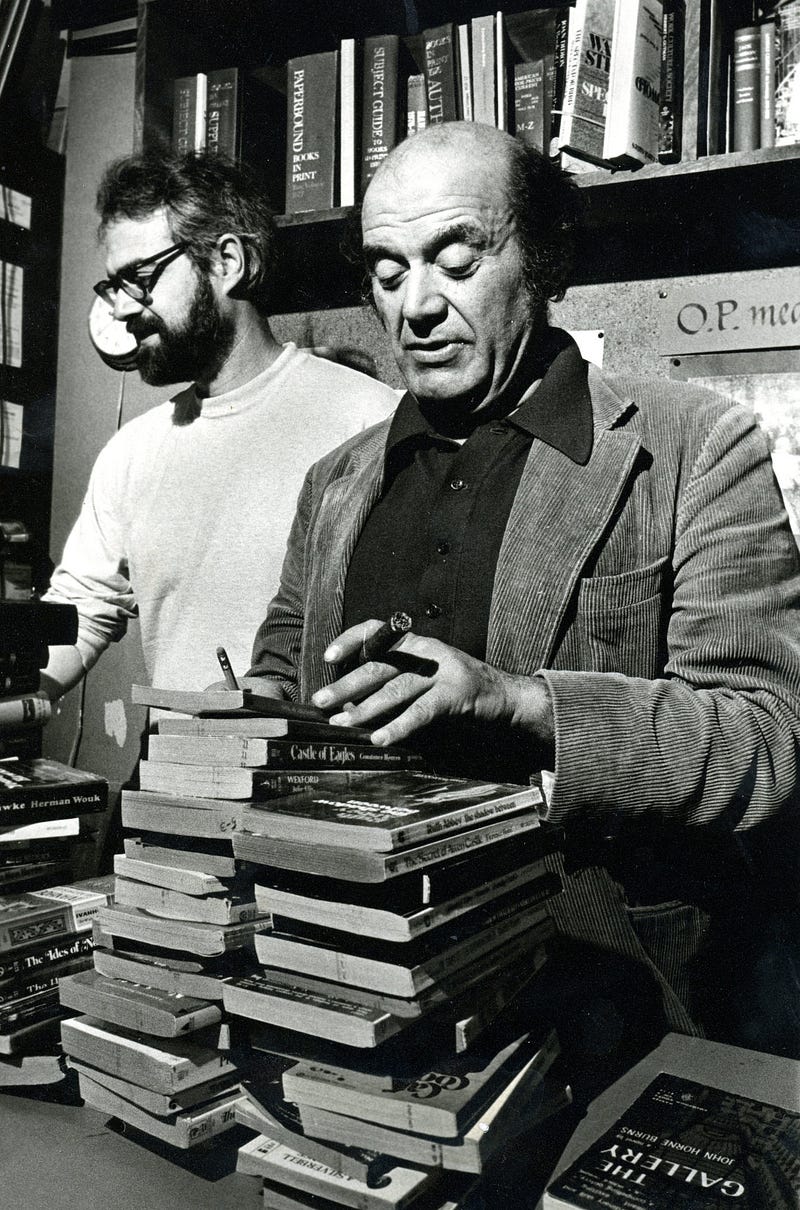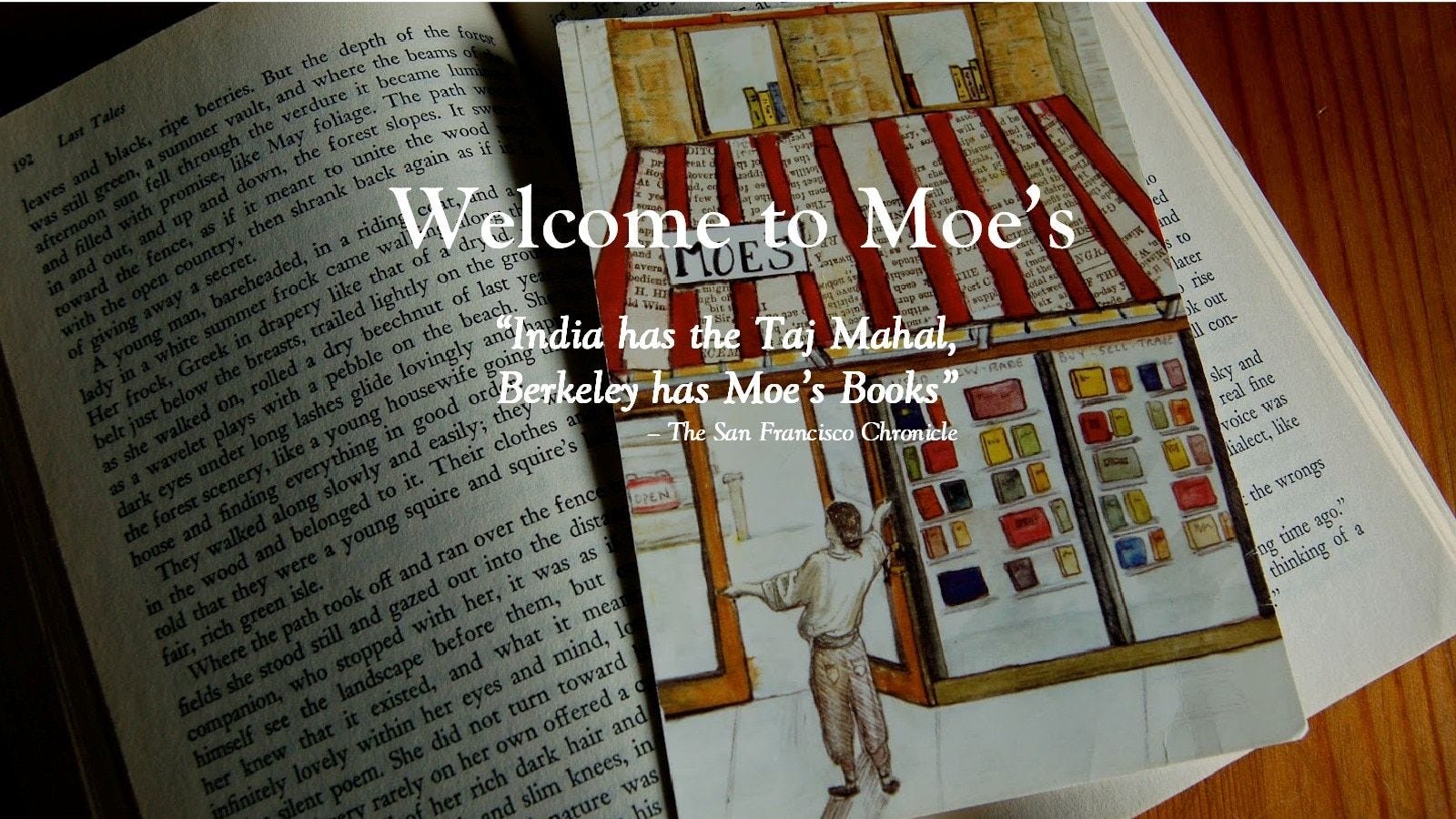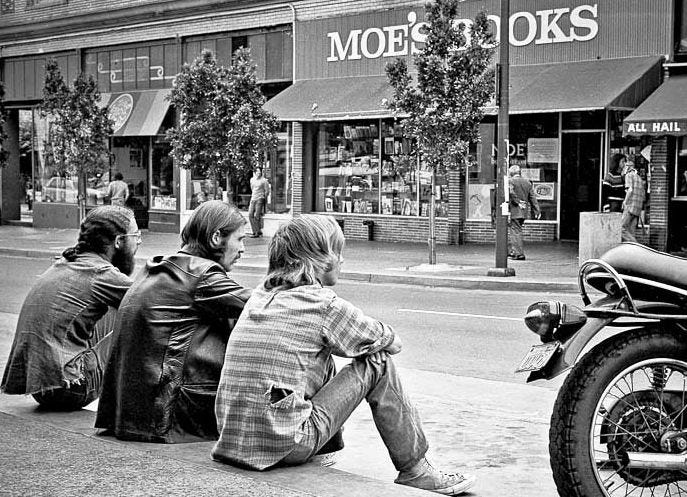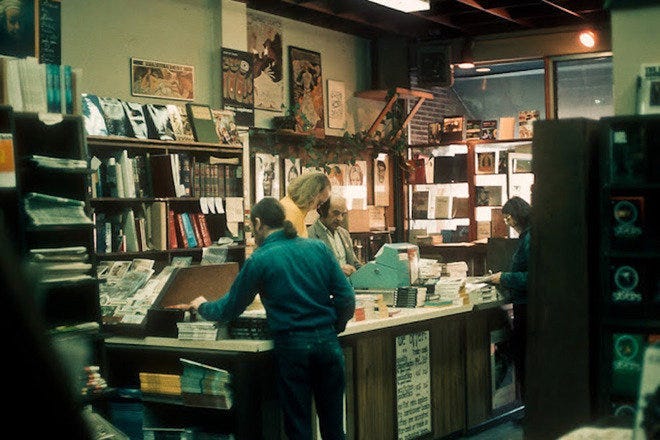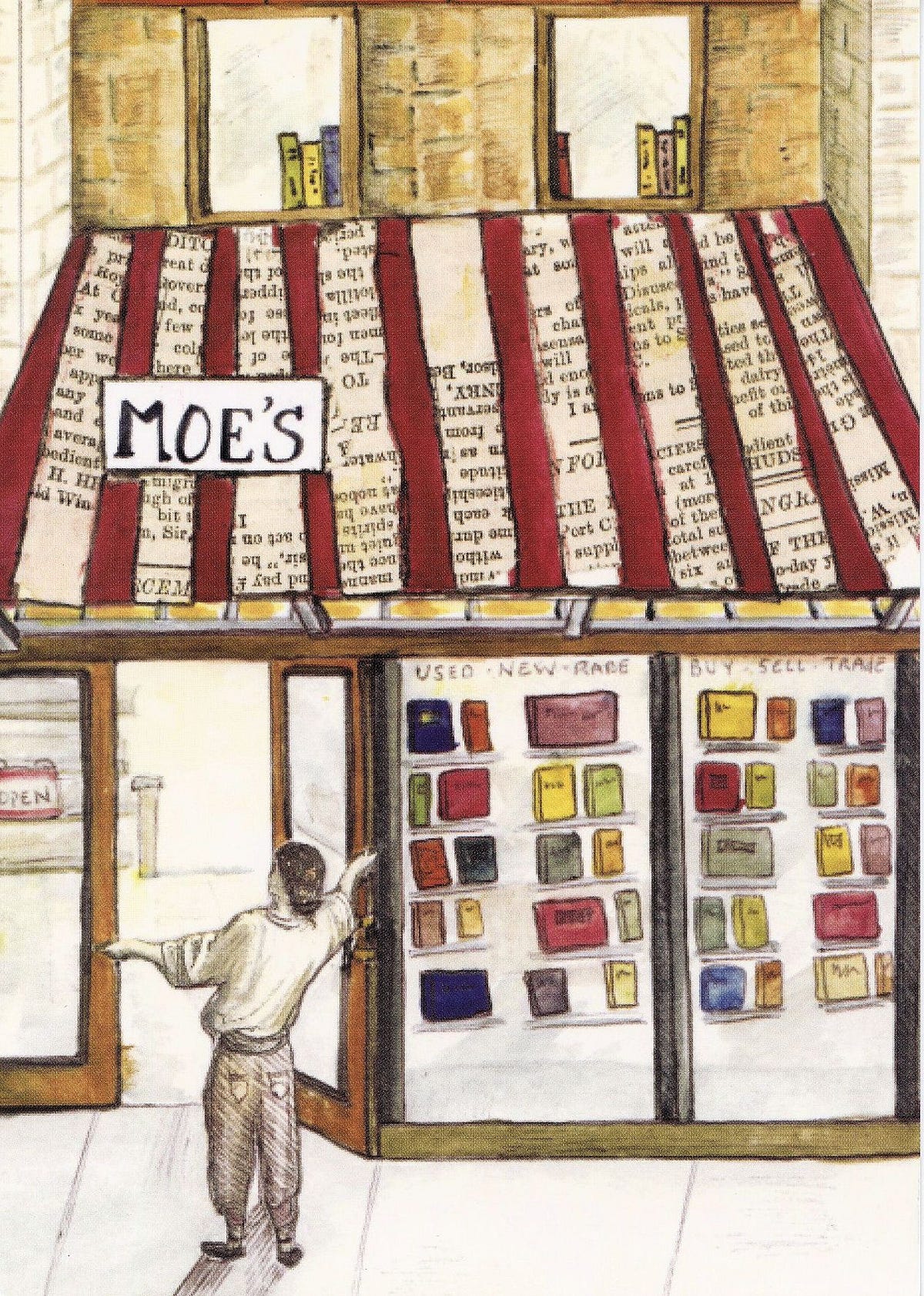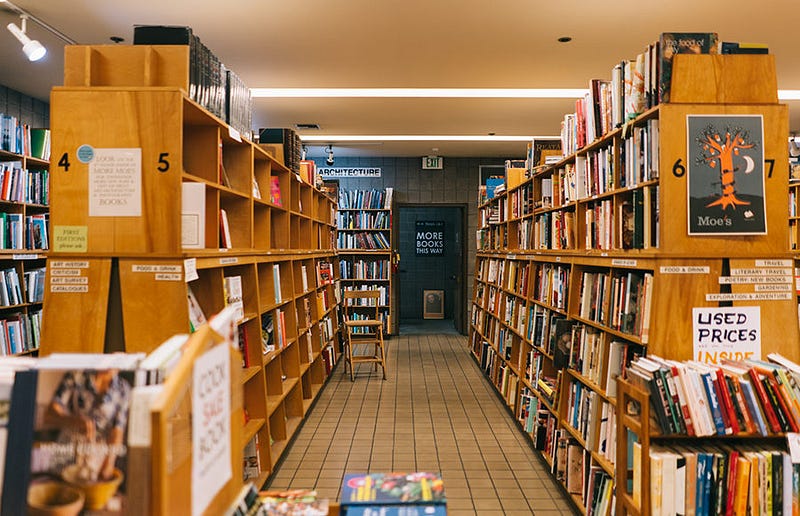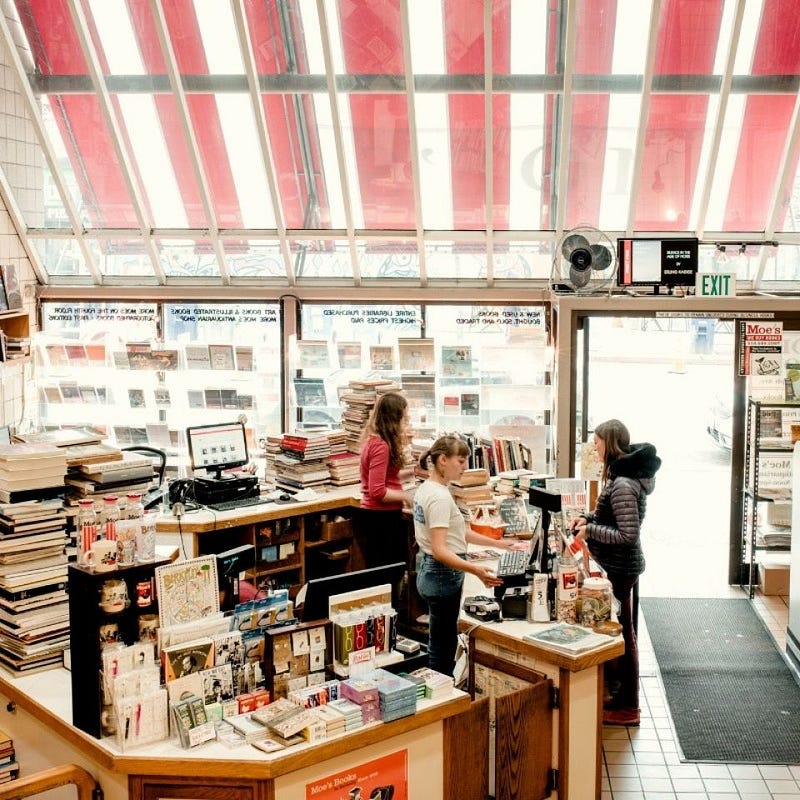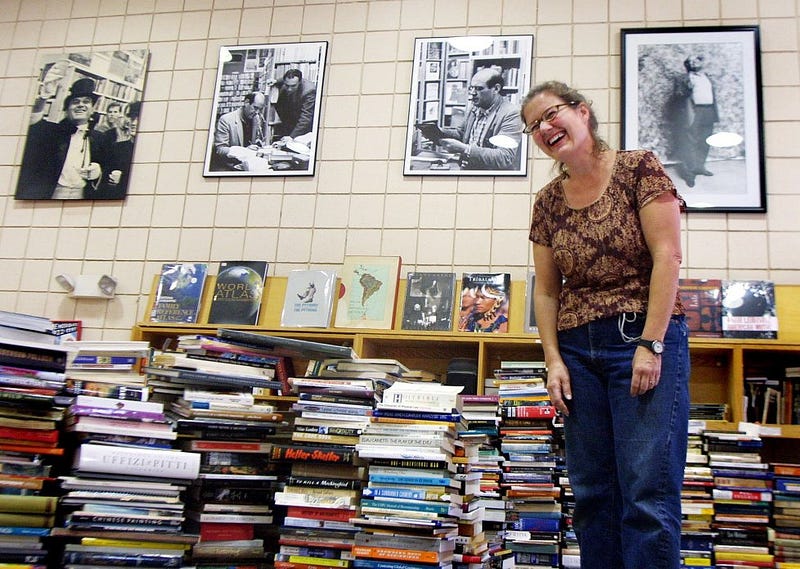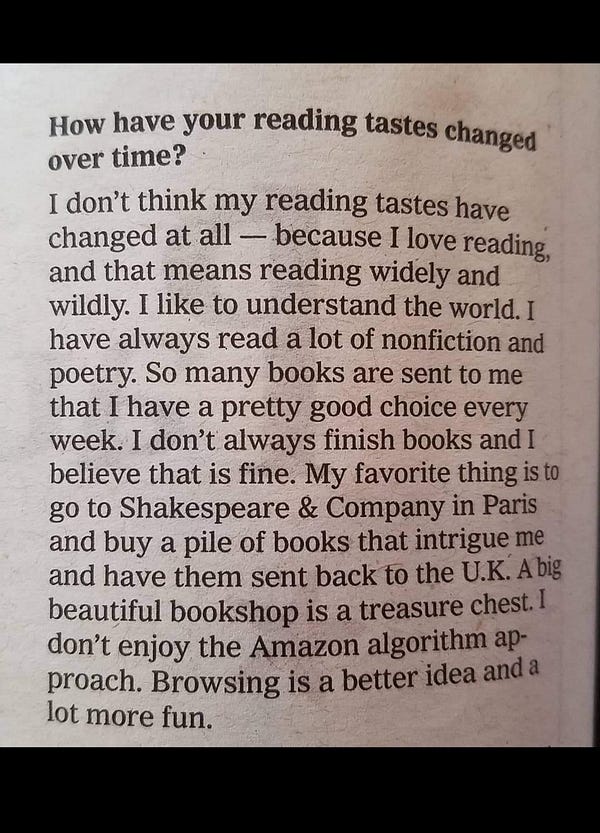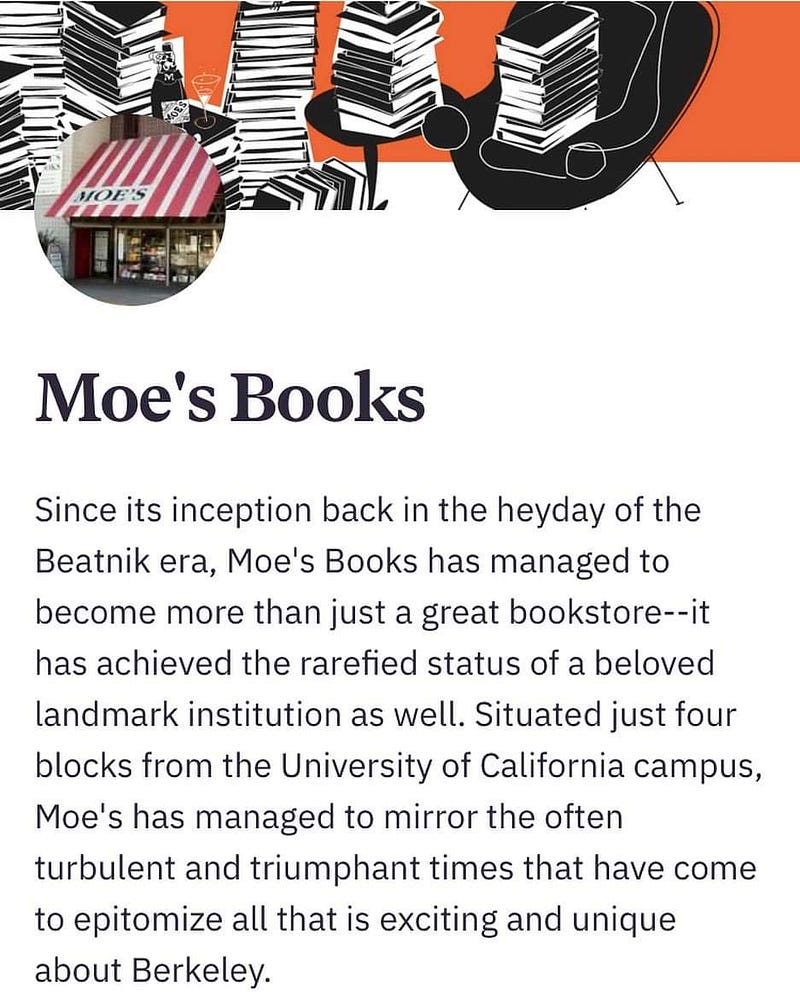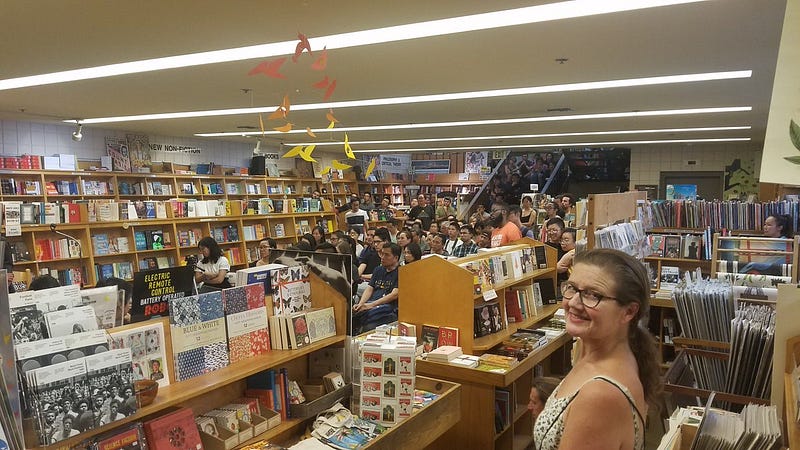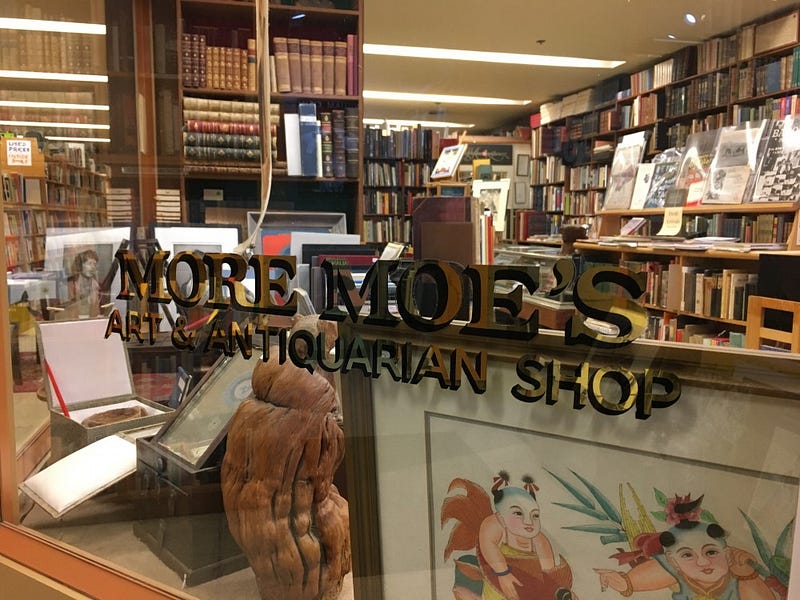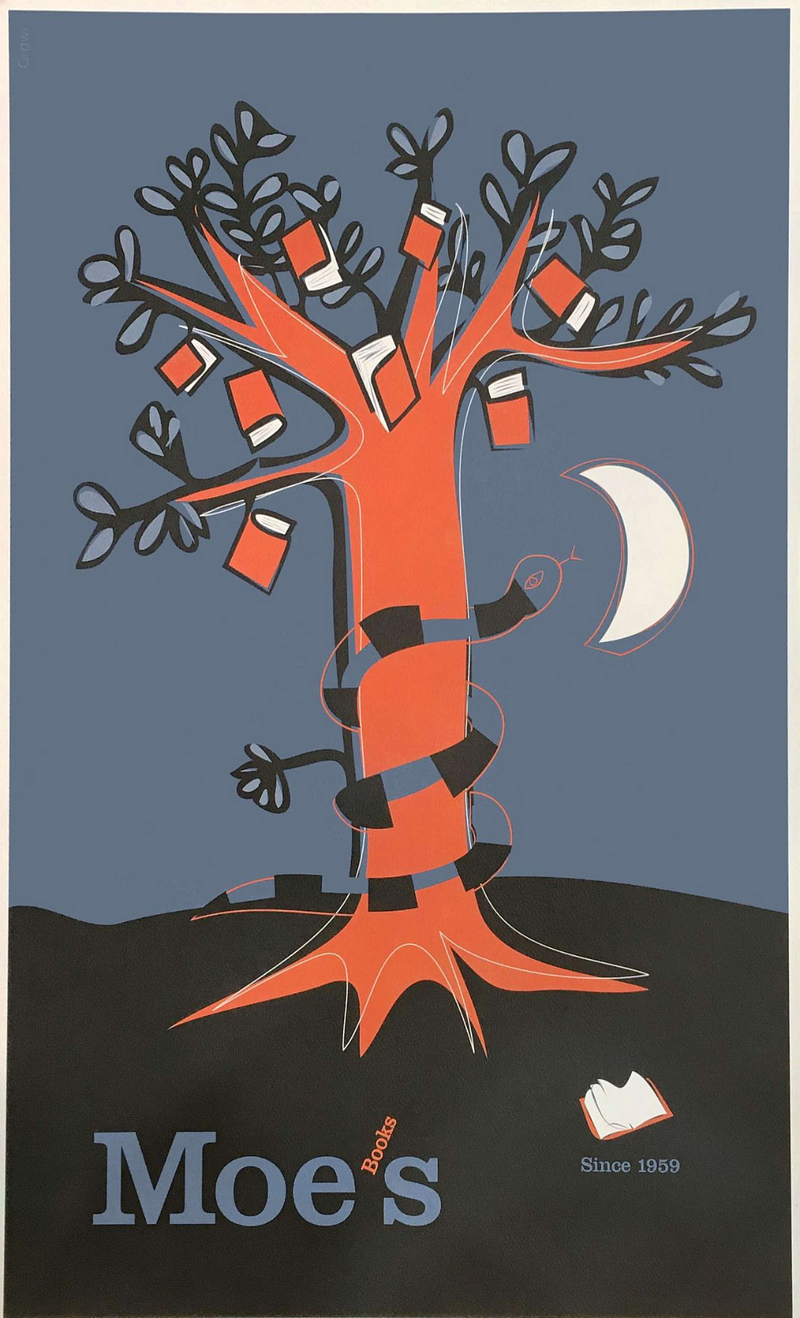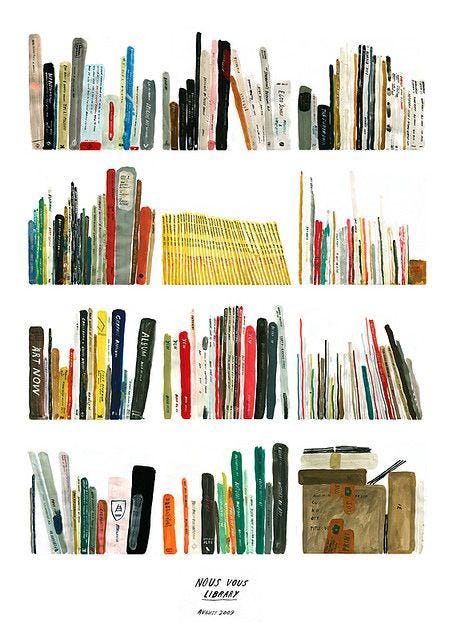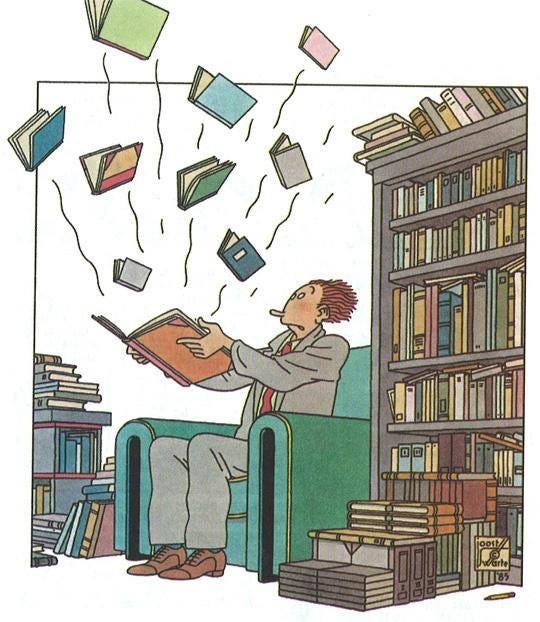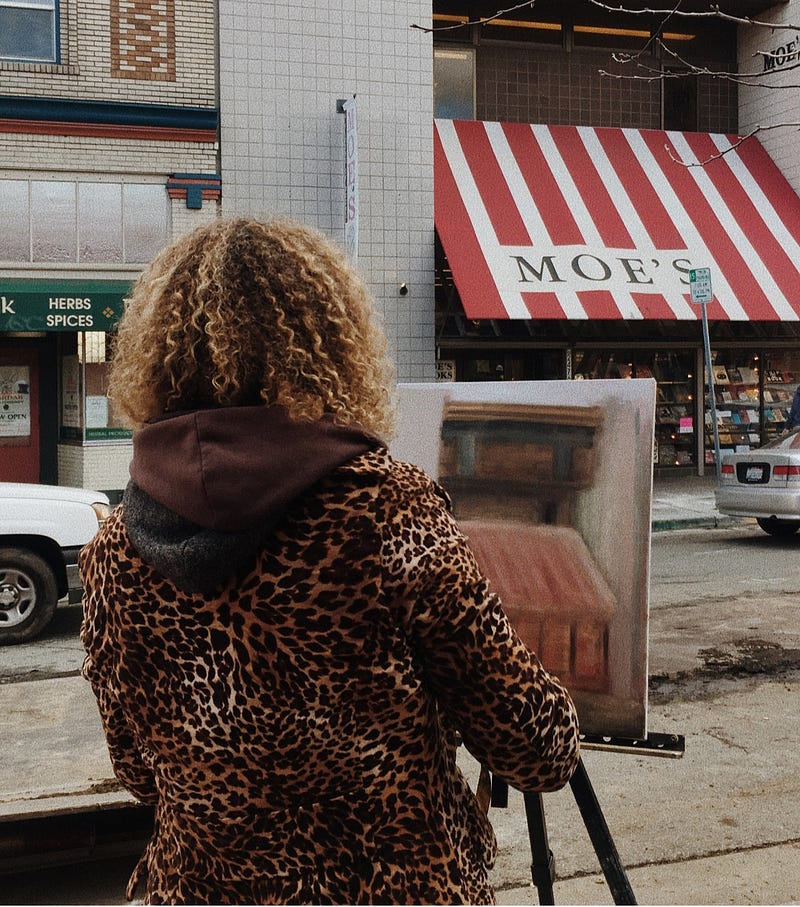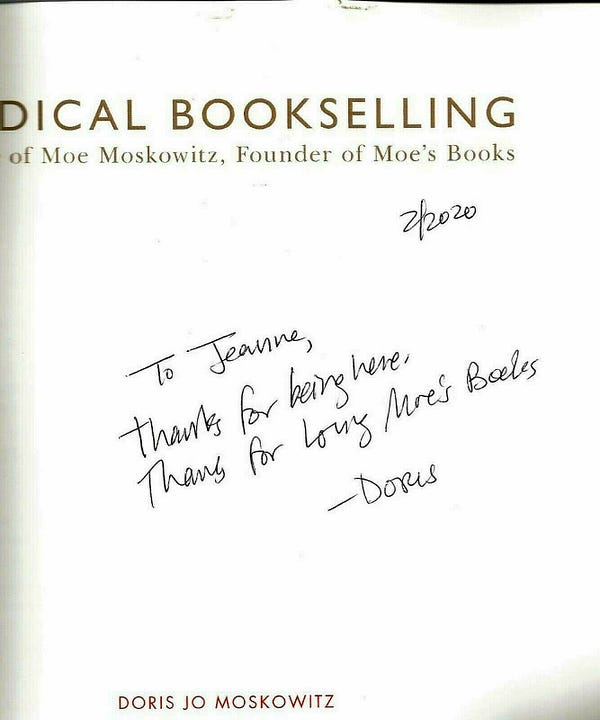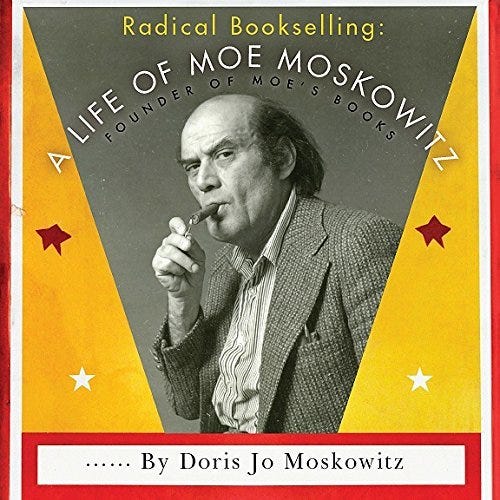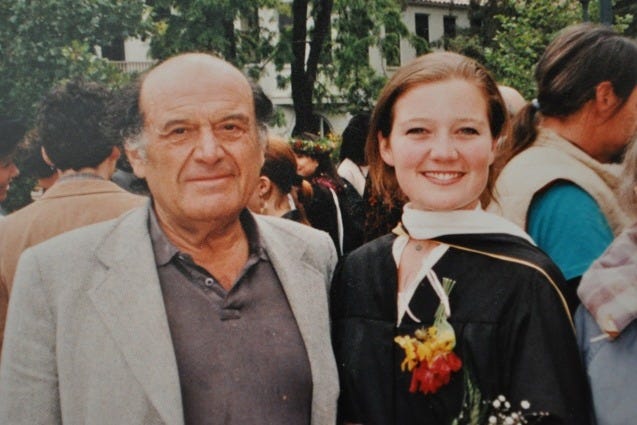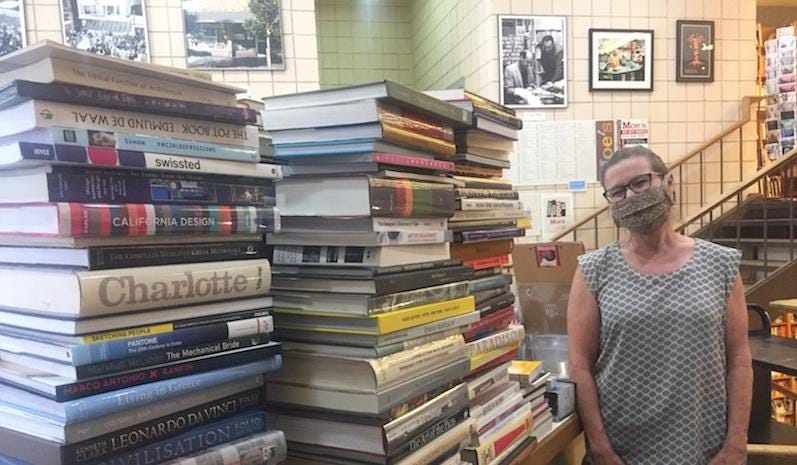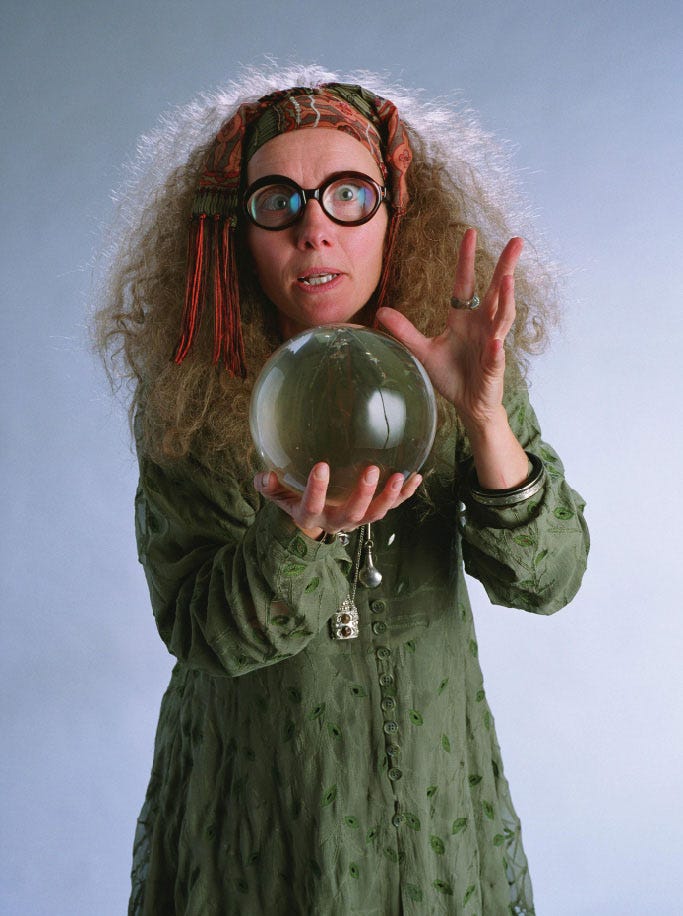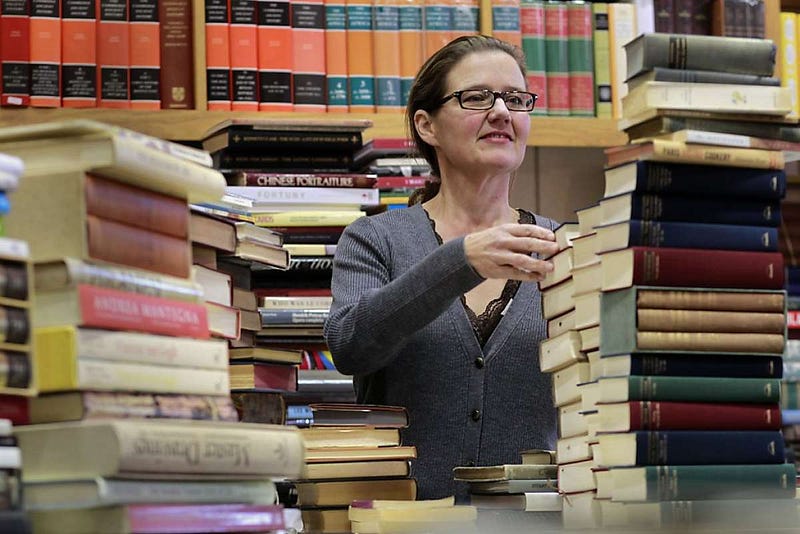An Interview with Doris Moskowitz : Owner of Moe’s Books
Doris Moskowitz was born in 1966, daughter of Moe and Barb Moskowitz.
Doris Moskowitz was born in 1966, daughter of Moe and Barbara Moskowitz.
After graduating from Mills College , majoring in English and Music, she started working with her father at the bookshop.
I love books,” says Doris. “One of my favorite classes at Mills was the History of the Book, taught by Martin Antonetti.
It was here fondness for books and the History of the Book class that inspired Doris to consider library school.
Before long, Doris was drawn to her family’s business. Her parents invited her to work in the shop so she could decide for herself if Moe’s was the place for her.
Doris Moskowitz
Doris Moskowitz was born in 1966, the youngest daughter of Moe and Barb Moskowitz. One of her sweetest memories is of…www.moesbooks.com
As any Berkeley book lover knows, Moe’s is an institution.
I had an interesting conversation with Doris about the history of the bookstore. We discuss her father, Moe, who founded the store, her mom, Barbara, cigars, hippies, the 1960s, and how independent bookstore can be resilient in the uncertain business environment?
Moe’s Books has a long legacy and holds a special place within the book selling community on the West Coast. Enjoy our interview. :)
Excerpts from the Interview : —
Q1) When and how Moe’s Books came into existence? Please tell our readers here about its rich and organic history. What was the mission and vision Moe Moskowitz had projected when he founded this book heaven?
Doris : Moe Moskowitz of Moe’s Books was a kind of loud mouth beatnik father to a generation. Moe embodied radical politics, radical theater, and radical bookselling. He put fun into being an intellectual and helped democratize literacy. If you were young in the 1960s in Berkeley when he held court at his counter, sharing jokes and politics, opinions, both warm and offensive, maybe you have wondered why he opened his monumental bookstore. Do you know why the San Francisco Chronicle said “India has the Taj Mahal. Berkeley has Moe’s”?
When Moe Moskowitz came to Berkeley in the mid-1950s, he brought with him a wealth of passions, causes, and ideas, but most pronounced of these values were irreverence and artistic, personal, and political freedom. He began selling books for fair prices on Telegraph Ave in 1960.
Moe Moskowitz
Moe Moskowitz opened the doors of Moe's Books in 1959, and so established one of America's preeminent independent…www.moesbooks.com
It was in the spirit of freedom and collaboration that he supported the Free Speech Movement and People’s Park. We are especially proud that none of our windows were ever smashed during the riots and that Moe allowed protesters to come through his store and hide out there if the police were especially brutal.
Sadly, in People’s Park, founded by earnest radicals hoping to create a utopian world, Moe saw that it had quickly become a failed anarchist experiment that supported a few people. The drug culture that usurped the vision did not and does not support the people that made it, the citizens of Berkeley, or the Moe’s Books community. Moe is famous for having called the 1960s icon “Some People’s Park.”
In 1977, Moe’s conflicts with the city’s smoking ordinances erupted. He had always smoked cigars and I was among a few who found it charming. Not everyone did.
Visiting Moe at Moe’s involved the cigar. He held a few in his pocket and one in his mouth. Usually unlit while shelving, he held down on the butt in the corner of his mouth. Often a piece of Cuban tobacco would stick and form a crust along the edge of his lip. Working the register he held the cigar in his hand while he rang people up. Often as was his custom he would stop the line of customers to talk about what was on his mind, political or personal, and hold court, maybe lighting his cigar as you watched. He smoked maybe two or three good cigars a day. A Macanudo or Cuesta-Rey. When the ordinance passed, he continued to smoke. Some customers, or people passing by, would come in and pass judgment on him and his cigar and the ills of smoking. David Lance Goines, another local smoker who saw the contradictions, gave Moe his poster “Everything Not Prohibited Is Compulsory” to display in the store. People give Moe credit but, alas, it should be credited to T. H. White in The Once And Future King. I hate to take it away from Moe, but there’s no denying it this time. Moe was not actually arrested for smoking in his store, just cited over and over again, but don’t tell anyone. Better to let the myth carry on.
How did Moe cultivate others’ passions and allow them to thrive? He let them do what they wanted. He respected their autonomy and encouraged bold choices.
He was actually arrested for selling dirty comic books in 1968. I found a list of items that had been confiscated from the store by police officers who arrested Moe for selling allegedly pornographic comic books and other obscene publications. Titles that were confiscated by police included Zap Comics #2 and Scum Manifesto. Moe said “I sold 350 copies of Snatch in three days. The comic books caricature sex,” he said, “but they’re clean stuff.” Bail was set at $500, according to the San Francisco Chronicle.
Moe also supported the Berkeley Barb, a weekly underground newspaper that was published during the years 1965 to 1980. It was one of the first and most influential of the counterculture newspapers of the late 1960s, covering such subjects as the anti-war and civil rights movements as well as the social changes advocated by the youth culture. Moe, of course offered the paper in the store, and he advertised in it many times. He promoted Robbie Basho and Country Joe and the Fish, whose albums he helped finance. He supported the fledgling health-nut Gypsy Boots by promoting his granola bars. Like a time capsule, the film New Mo’Cut speaks of intellectual and fun pursuits before things got really freaky in the late ’60s. The jolliness of the evening describe a pinnacle of ridiculousness and happenstance that brought so many interesting people into Moe’s orbit and Moe’s Books.
Since its inception back in the heyday of the Beatnik era, Moe’s Books has managed to become more than just a great bookstore — it has achieved the rarified status of a beloved landmark institution as well. Situated just four blocks from the University of California campus, Moe’s has managed to mirror the often turbulent and triumphant times that have come to epitomize all that is exciting and unique about Berkeley.
Founded in 1959 by Moe Moskowitz and his wife, Barbara, the original site of the store was a small shop on Shattuck just north of University Avenue. He moved the store up to Telegraph Avenue in the 1960s, right in the middle of the Free Speech Movement and the famous anti-war demonstrations that put Berkeley on the political map.
Moe Moskowitz began a revolution of his own, one that altered the landscape of the used book business. He set policies assuring our customers of the highest prices paid for used books, and the tireless staff was trained to keep the stock fresh, interesting, and of the highest quality possible. They were given the personal freedom to do this as they saw fit.
The Berkeley Historical Society commemorated Moe’s Books as “a pioneer of giving honest, fair prices by establishing a fair trade policy of offering cash and higher value in trade for used books” in a beautiful plaque in 2013.
How did Moe help democratize literacy? Posting the amounts that Moe would pay for books on the wall behind his counter, was new to the book business in 1959. Others had accepted books and sold them again, but pennies were given in return for the books having once been read. The book lovers in NYC, where Moe was from, for example, had no choice but to accept the small offers that book dealers made to them when they tried to sell their books back. This is how the textbook business is today. The establishment of a Fair Trade policy at Moe’s Books elevated the status of books. It brought up the dollar value and made it possible for the owner of the book to share in the future profit from the reselling of the book through the higher amounts paid. No longer to be considered “used up” when a book had been read once, now, if you sold a book, you could redeem some of the cost of your original purchase. If you wished to trade your books for more books, you would receive an even better deal.
This is Moe’s great contribution to the life of scholars, a fair break. We proudly carry on this tradition by making fair trade offers all day every day. To have a “Trade Slip” from Moe’s is like a secret membership card that says you know something about the value of books.
Our policy is about the utopian notion of establishing our own currency and working beyond government control in an underworld, of sorts. As we have recast the notion of bullion, we have redesigned society. We have put the knowledgeable person in a position of power. In our construct “knowledge is power.”
In Berkeley, books feed you. Moe’s Books made that sustenance accessible to anyone one who knows just the littlest bit about knowledge. Having read one book, you are a part of our economy. Book knowledge is power at Moe’s.
Q2) What do you love most about being a bookseller? What do you think is the role of an independent bookstore, or the role of booksellers at an independent bookstore?
Doris : I love knowing that we are providing comfort to people during this very difficult time. When people come in and see that the store is okay, we are here, the books are on their shelves, they seem to feel maybe everything will be okay. Bookstores provide a safe place to breathe and think and be alone with your own mind.
Q3) How did the books you read helped you when you started to work as a bookseller? When did you fall in love with books?
Doris : Growing up with parents who loved books, but loved them very differently, I could have easily rebelled against reading, but instead I found that they were both right. Moe loved to read and argue over the facts that he had collected, my mom, Moe’s silent partner, loved to read stories and share her passion for printing. I read mostly novels, but I do love to read!
One of my favorite classes at Mills was the History of the Book, taught by Martin Antonetti. In the Bender Room of the old library, he’d bring out these very old books and place them on blue velvet fabric, and we’d discuss the print and binding. I loved it.”
Q4) What’s your bookselling philosophy?
Doris : I suppose, if I had to say, my strategy seems to involve constant motion. I value hard work, teamwork, facts, standards, and adaptability. Doing my best everyday, I hope that we are keeping the Moe’s legacy alive. Is that a philosophy?
Q5) In one of your podcast you said that — “Moe’s Books staff’s understands bibliophile expectations. They ensure that every book they keep on the shelf is hand-picked and well-curated, the staff believes in leading a personal touch to book discovering experience ‘’. Can you please elaborate on this? How does the staff do their homework or decides which book to curate ?
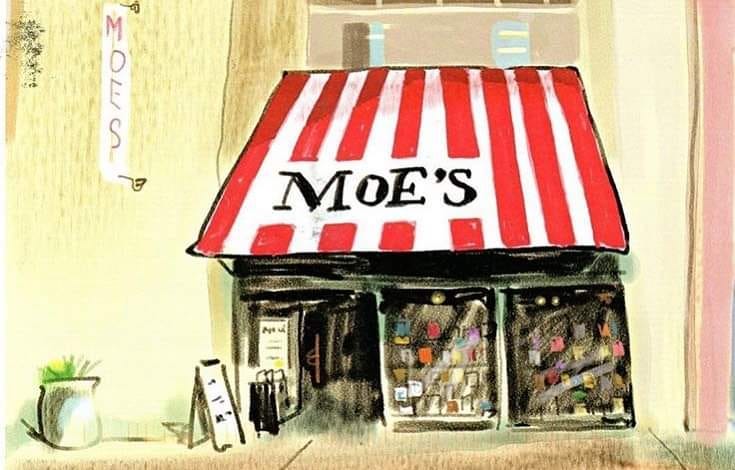
Doris : Curation is an important aspect to any great bookstore. We constantly rework sections, repricing books that have been on the shelf too long and removing those that have not sold. Even a good book will be removed from a shelf if no one has shown any interest in it for too long a period of time. It can be painful to remove a book, but we need to make room for others. We can not afford to be sentimental. Used books are offered to us everyday. 60 years in business affords us the privilege of only bringing in the books that we believe are the best. This keeps the quality of the stock up.
With regards to which new titles we bring in, our experienced buyers know instinctively what our customers are interested in reading. There are so many books published every year but we only want to have the ones that our customers want. As I said, we are not sentimental even as we promote literacy in every way we can. We only order books that our customers want.
Q6) Independent Bookstores allow people to better understand the world around them. To think for themselves. To indulge in a sense of culture. They are cultural hubs in any community, central to the fabric of shared values and interests that make towns and cities vital. They lend character to a place and give residents and book lovers a sense of belonging.
Do you agree with this?
Doris : I agree absolutely, but chain stores have a place in the world too. In places where people have nowhere to go but the mall, a Barnes & Noble is still full of books. It is still a place to saturate oneself in book culture. The more books the better!
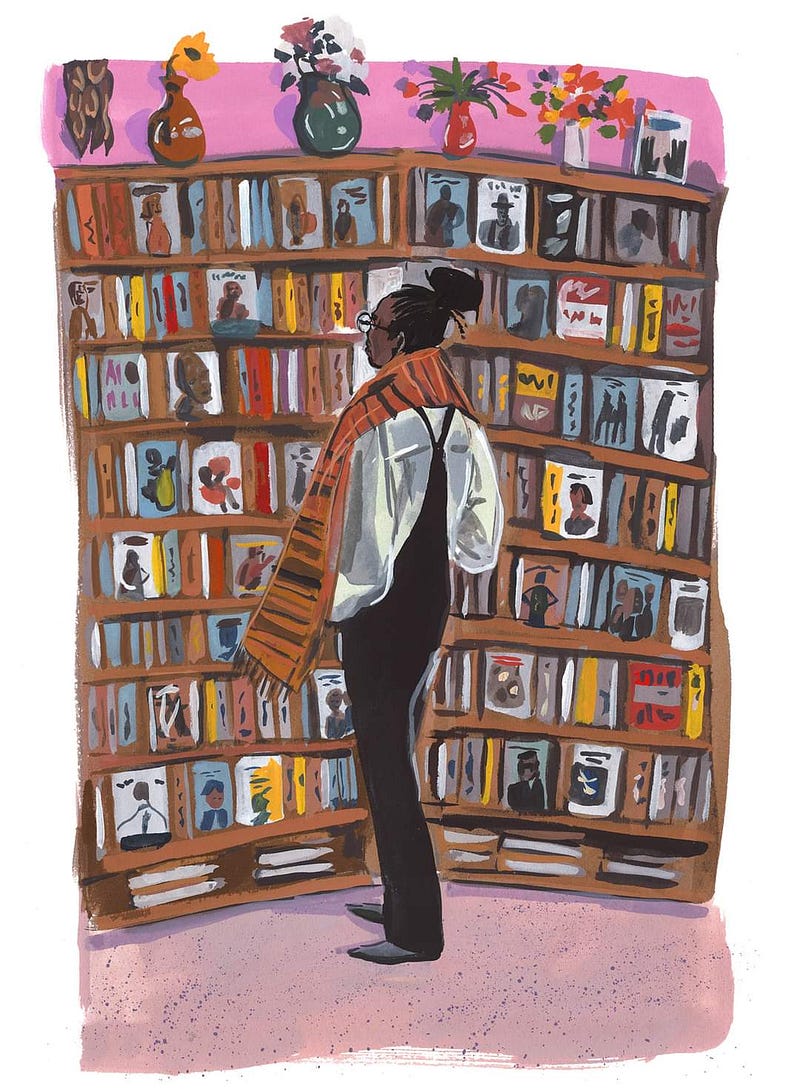
Q7) Tell us about the book you had written — “Radical Bookselling: A Life of Moe Moskowitz. What inspired you to write a biography of your father?
Doris : Ever since Moe died in 1997, I have tried to get a book written about him. I know many authors who knew him and loved him. I asked. I nudged, I begged… and 20 years went by. I thought that my book about him would be too sentimental, if no one else was going to do it then I had to write it myself. He deserves a bigger better book, but I did my best. I like to think that he would be proud of it.
Q8) What sort of activities/workshops and discussion does Moe’s conduct with respect to online or offline events in collaboration with authors and book launches? Tell our readers here about any memorable event or workshop or any interview which happened at the bookstore.
Doris : Bookstore parties are fun. We turned 60 in October. We had cake and music. We had the author and publisher in for a big party when The Battle for People’s Park 1969 came out. The community came out to reminisce.
The Battle for People's Park, Berkeley 1969 - Heyday
The Battle for People's Park, Berkeley 1969 commemorates the fiftieth anniversary of one of the most searing conflicts…heydaybooks.com
Q9) Being surrounded by books every day must give you plenty of opportunity to discover new authors. Who are your all-time favourites?
Doris : Orhan Pamuk, Rebecca Solnit, Chip Kidd, Colson Whitehead, Magda Szabo, Ta-Nahisi Coates
Q10) How are you reinventing Moe’s Books? How Covid-19 has changed the equation? It’s a strange time for everyone indeed. How are you currently tackling the new normal? The Pandemic Is Changing How People Buy Books. Of course, Amazon is still a monster, but booksellers are a hardy bunch and I am saying this with my personal experience ☺
Doris : I am just showing up everyday, hoping that something will shift. Even on the worst days, I am always glad that we were there to comfort someone. Moe’s really does seem to mean something to people. They get the message that everything will be ok. It will, one way or another. I suppose that I am blessed to have some things in my life that are important to me, books, Moe’s Books, and people.
Q11) Any trends or predictions for the bookselling industry? Are there any plans for future that you would like to share with our readers here?
Doris : Do you have a crystal ball? :P
Thank you all for reading and a big thanks to Doris Moskowitz for collaborating in today’s post!
It’s a pleasure!
If any of my readers here , wish to know more about the bookstore and their work. Do open the links mentioned below . They have a wonderful informative , articulated and well-curated website. It has all the essential details about the upcoming author events as well as their latest books subscription offerings!
Website : https://www.moesbooks.com/
Instagram : https://www.instagram.com/moes_books/
Facebook : https://www.facebook.com/MoesBooks/
Twitter Handle : https://twitter.com/moesbooks
